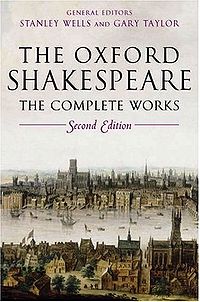- The Oxford Shakespeare
-
The Oxford Shakespeare is a common term for the range of editions of William Shakespeare's works produced by Oxford University Press. The Oxford Shakespeare is produced under the general editorship of Stanley Wells and Gary Taylor.
Contents
The Complete Works
The series includes The Complete Works, a single-volume modern-spelling edition first published in 1891; the first editor was William James Craig.[1][2] The second edition, edited by John Jowett, William Montgomery, Gary Taylor and Stanley Wells, appeared in 1986.[3] It includes all of Shakespeare's plays and poems, as well as a biographical introduction. Each work is given a single-page introduction. There are no explanatory notes, but there is a glossary at the back of the book.
The Oxford Shakespeare differs from other Shakespeare editions in attempting to present the text as it was first performed, rather than as it was first printed. This resulted in many controversial choices: for example, presenting Hamlet with several famous speeches relegated to appendices on the grounds that Shakespeare added them after the original performances; presenting two separate texts of King Lear due to the drastic differences between the two extant texts; and changing the name of Falstaff in Henry IV Part One to 'Oldcastle' due to historical evidence that this name was used in the first performances even though it never survived to print.
The Oxford Complete Works was the first to emphasize Shakespeare's collaborative work, describing Macbeth, Measure for Measure and Timon of Athens as either collaborations with or revisions by Thomas Middleton; Pericles as a collaboration with George Wilkins; Henry VI Part One as a collaboration with several unknown other dramatists; and Henry VIII and The Two Noble Kinsmen as collaborations with John Fletcher. It also broke with tradition in presenting Shakespeare's works in chronological order, rather than dividing them by genre.
In 2005, a second edition of the Complete Works was produced. It adds a full text of Sir Thomas More (edited by John Jowett), which may contain passages by Shakespeare, and Edward III (edited by William Montgomery), another play believed to be partly by Shakespeare.
The Norton Shakespeare, published by W.W. Norton, is largely based on the Oxford text, but departs from some of its decisions.
Other components
 The Oxford edition of Timon of Athens
The Oxford edition of Timon of Athens
The series also includes William Shakespeare: A Textual Companion, which provides additional data for scholars of the plays, and William Shakespeare: An Old-Spelling Edition, which presents the plays in their original spelling.
The term 'Oxford Shakespeare' also refers to Oxford University Press's editions of individual Shakespeare plays and poems. The Oxford individual editions follow the same principles as the Complete Works, although their editors are permitted to reject choices made for the Complete Works if they feel strongly; for example, David Bevington's edition of Henry IV Part One uses 'Falstaff' not 'Oldcastle'. The hardback editions feature distinctive purple dustjackets, while the paperbacks follow the design of the Oxford World's Classics editions of classic literature.
References
External links
Categories:- Shakespearean scholarship
- Oxford University Press books
Wikimedia Foundation. 2010.

